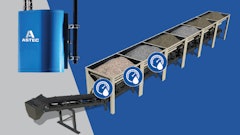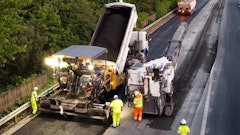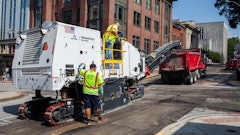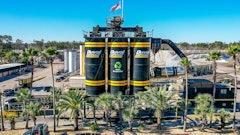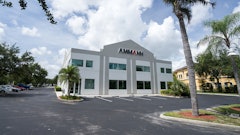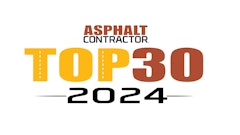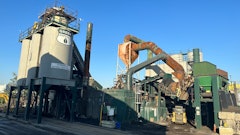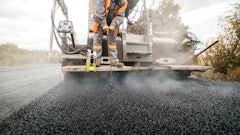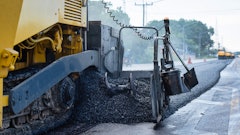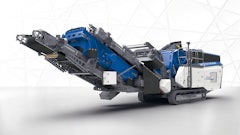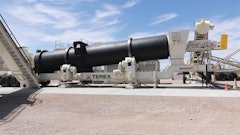
Returning from PaveX and considering whether it makes sense for your paving business to begin producing your own asphalt? This is a common scenario for many paving companies that do not currently produce for themselves, and there are numerous considerations before deciding to make the investment.
Likewise, it is just as important for paving companies that already produce their own asphalt to understand when it may be right to upsize their current asphalt plant. Through the eyes of one paving business that recently took the leap to produce its own asphalt, this article will help you explore whether your business could benefit from adding an asphalt plant to your operation.
Trent Nielsen, president and owner-operator, Nielsen Blacktopping & Concrete in Kasota, Minn. asserts, “As an asphalt and concrete paving company, owning your own asphalt plant is a real game-changer.” A third-generation, medium-size business, started by Trent’s grandfather, Carl Nielsen, in 1969, and passed to Trent’s father, Craig Nielsen, and ultimately to Trent and his brother, Chad Larson, in 2006. The company operates within a 60-mile radius in southern Minnesota.
As a third-generation contractor, Nielsen Blacktopping and Concrete provides expert service in asphalt paving and concrete, excavation and preparation, and maintenance and restoration. Trent stated, “Purchasing our own asphalt plant enabled our business to expand from a mostly residential and commercial paving company to a major player in municipal/public projects by completely changing the bidding process.”
He continued, “Pretty much all of our competitors in the area produce their own asphalt. Now that we produce ours, our pricing is more efficient and competitive to begin winning bids. Buying our product outside at higher prices and iffy availability was previously a big issue when it came to winning bids over our competition.”
Trent further remarked, “Producing our own asphalt even helped our residential and commercial projects because we’re easily able to get the different mixes we need for paving and patching driveways and parking lots. Not being in the metro area, it’s really important to be able to supply your own asphalt. Otherwise you don’t have control of your market.”
Trent explained, “Realizing control over your schedules, mix qualities, and mix specs makes a big difference in the number of jobs we can handle. When we bought our asphalt through outside sources, there were often quality control issues with the product due to labor shortages, and it was difficult to get the turnaround on the product we needed to get our jobs done when customers needed them done.”
After completing their research and getting a number of pre-prep items in place, Nielsen Blacktopping & Concrete purchased an ADM EX 7636 counterflow asphalt plant. Asphalt production started in June 2022 with two silos. By Spring 2023, Nielsen added a third silo to supply asphalt to other businesses, and in June of that same year, the company had its own lab operational.  Nielsen Blacktopping & Concrete in Kasota, Minn.Provided by ADM
Nielsen Blacktopping & Concrete in Kasota, Minn.Provided by ADM
With the lab, Nielsen was able to test the mix and show customers the results. Trent said, “So far, this has been a big plus. Showing test results really gets the decision made for customers to go with the project. Our local cities do testing as well, and being able to offer companion testing has given us a real competitive advantage. Our plant operator, Troy Borwege, has his Bituminous Mix Designer Certification (BMDC) and is able to make quick adjustments for quality control of the mix.”
In making the purchase decision to buy a plant, Trent stated, “Setting up your own asphalt plant is not for the weak of heart, but with the right asphalt-plant manufacturer, one that focuses as much on service as on the sale of the plant, the payoff is worth it,” Trent remarked.
Many considerations come into play to help determine whether the purchase of an asphalt plant is right for a particular asphalt paving business. Some of those key considerations in making that decision to purchase a plant includes:
- A paving company’s market size
- Location
- Start-up expense
- Plant features
- Return on investment (ROI)
- Understanding when to upsize
Assessing your market size is the first place to start to determine whether buying an asphalt plant is advantageous to a paving company. Trent remarked, “One of the first factors in making our purchase decision was knowing we would have a reliable aggregate source for making our asphalt. We developed a relationship with an aggregate producer who was expanding his gravel business. Having an aggregate source was as key to deciding to buy a plant as being able to control our own mix.”
Market size also includes such factors as your company’s annual asphalt usage and cost to your business, estimating the number of additional jobs your business could accommodate annually without the wait time, and the potential for selling the asphalt you produce to outside businesses.
Trent completed a cost-per-ton analysis, and because he knew pavers go to the closest plant to get product, he would be able to draw cities and counties to buy Nielsen’s asphalt, in addition to making the company’s own.
The location of where a company plans to put its asphalt plant impacts permitting for the plant, transport of the plant, plant size, and even the appropriate plant type. Permitting rules and fees vary greatly from one locality to another and are different state-by-state, as well.
Trent said, “Once we knew market size was viable, we pulled off application and permitting before making our plant purchase. We checked compliancy with Minnesota Pollution Control Agency (MPCA) regulations, a big factor for us since hot-mix asphalt facilities in our locale, including portable plants, must have a permit for stormwater and wastewater activities.”
Location also factored in for Nielsen Blacktopping & Paving. The company made sure that the planned plant location was strategic in being able to sell asphalt in the Western counties and the Southwest edge of Mankako, Minnesota.
ADM says that start-up expense is another consideration in whether it is advantageous to supply your own asphalt. It’s important to determine factors such as the additional labor your business will need and cost of mix components, both of which will help you to determine how much you will need to charge per ton to turn a profit, if you are selling to competitive pavers, and how much you will save on your own material costs, using asphalt you produce instead of purchasing from an outside source.
Obviously, a major factor in start-up expense is the price of the plant. It’s important, however, according to ADM, to stay focused on what type of plant makes the most sense for the current market situation and future potential. A plant may cost less initially, but if it isn’t fuel-efficient or doesn’t produce enough tons per hour for efficient operation, it will cost more over the course of its lifetime.
A fourth consideration in determining whether your paving company can benefit from the addition of an asphalt plant, comes down to plant features. Plants with counterflow technology, like the ADM EX Series plant which Nielsen purchased, will maximize fuel efficiency while minimizing hydrocarbon pollution. Clean-burning plants will also extend the life of the baghouse, and the efficiency of counterflow technology will result in increased production.
Easy calibration of a plant is another important feature, both when purchasing a plant for the first time or expanding to a larger plant. This will lower the risk of drifting out of spec, which in turn gives producers confidence in the product they are producing while helping to guarantee customer satisfaction. Easy calibration is especially important when producing mix for Superpave jobs as Nielsen does for its municipal customers. Nielsen produces Minnesota DOT Superpave product in six different mix designs.
As a paving company compares plant prices and determines what is included with each model, it’s important to also consider the plant’s operating costs and production capacities.
Realizing a paving company’s ROI expectations from the purchase of its own asphalt plant, the business needs to project its potential bottom line improvements to help make an informed decision to purchase. Trent explained, “It’s a numbers game. We looked at how much our labor efficiency would be improved. We understood we wouldn’t have an outside asphalt bill. We knew we would have better cash flow because we could produce as we went, rather than making up-front product purchases. Our outside costs were going up due to inflation with fuel and aggregate.”
Trent continued, “In the end, making our own asphalt in the first-year cost as much as going outside for asphalt the previous year, but product availability was king. We weren’t cut off by the oil contractors which was a real concern before we made our own asphalt. When it comes to ROI, it was also important to look at how fast we could pay the plant off. Again, it’s a numbers game.” Nielsen Blacktopping & Concrete in Kasota, Minn.Provided by ADM
Nielsen Blacktopping & Concrete in Kasota, Minn.Provided by ADM
For paving companies that already have an asphalt plant, it is important to know when and if the time is right to upsize. If you’re already in the asphalt production business, you may be considering a newer, larger capacity plant. Just as you did before buying your first plant, consider your market size, location, long-term expenses, and plant features when examining the costs and potential savings of buying a new plant.
A more efficient, larger capacity plant will not only allow your company to take on more projects (if your market size allows it), but bigger projects, as well. Plus, a newer plant will reduce maintenance costs and emissions while offering a better mix consistency.
If you’re a plant owner looking to upgrade components, it’s worthwhile to consider newer, high-quality parts. Improved components such as baghouses will help you reduce emissions. Recycle systems allow cost-efficient RAP to be used at higher percentages. Better quality storage tanks in modern plants offer a more economical way to store and monitor pricey liquid asphalt cement, while newer storage silos provide a way to keep freshly mixed asphalt at an ideal, constant temperature until it is ready to be discharged.
A big part of Trent’s initial homework in deciding to make the asphalt plant purchase for Nielsen was a visit to an asphalt plant that already had the brand and model he was considering. French Broad Paving/ Madison Asphalt, located in Madison County, North Carolina had recently purchased an EX 7636 counterflow plant to begin producing their paving company’s own asphalt.
“I was comfortable with their operation and equipment. They basically operate similar to how Nielsen operates," Trent said. "We liked what we saw, so the trip was helpful in making our decision. Now that we produce our own asphalt, our trucks are no longer waiting in line for asphalt supply or unable to work on projects because we’re cut off at 5:30 p.m. With our own asphalt, we can work through the weekend like we did recently for a local hospital parking lot, producing 2,400 tons in a 2-day period to get the job done.”








